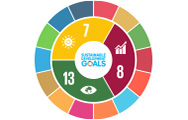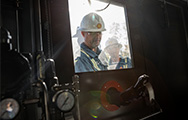Letter from the CEO

Ben van Beurden CEO
Early 2020 has been a time of extraordinary turbulence because of the spread of the COVID-19 pandemic. It has affected so many people around the world. Many have lost their lives.
At Shell, we are doing everything we can to help in the global response to the virus. We are focused on protecting our staff and customers and supporting communities where we operate. We are working to ensure that our operations are resilient so we can continue to provide energy, helping to power hospitals and supplying fuel for ships to get goods around the world. Our chemical plants are stepping up production of isopropyl alcohol, a key ingredient of hand-sanitising liquid.
How this will all unfold in the short term is still uncertain, of course, but as the world battles to overcome what it is struggling with today, Shell will seek to assist in whatever way we can.
At the same time, Shell remains keenly aware of the longer-term challenges facing our society.
In 2019, demands for urgent action on climate change grew ever louder. All of society, from consumers, to businesses, to governments, recognised the need to accelerate global efforts to reduce greenhouse gas emissions.
Shell shares this sense of urgency. We continue to take climate action on many fronts, including tackling our own emissions and helping customers reduce theirs by expanding the choice of lower-carbon products we offer. We are working hard to play our part in the global transition by providing more and cleaner energy.
But we – and society as a whole – need to do much more because change is not happening fast enough.
You can read about our progress on helping tackle climate change, and our efforts to meet society’s expectations in this area, in the 2019 Sustainability Report. Of course, we must also work to meet society’s expectations in many other areas.
Our approach to sustainability can help us to be ultimately trusted, valued and supported by society.
Responsible business
Sustainability at Shell comes down to three things.
The first is running responsible and profitable operations.
We have made progress on improving the safety of our operations since the early 2000s. This is largely due to more effective standards and requirements, such as the Life-Saving Rules. It is also the result of a stronger safety culture, guided by our Goal Zero ambition to achieve no harm and no leaks. But sadly we have not been able to eliminate all fatal incidents involving Shell employees and contractors.
Tragically, seven people died while working for Shell in 2019. This is unacceptable. We must strive to do more and continuously improve our efforts to keep people safe.
We are building on our current approach to safety with a more consistent focus on the way people, culture, equipment, work systems and processes all interact. Many of our fatalities over the last five years were due to the complex interaction between these elements. We need to better understand the gap between how we expect work will be done safely and how the work is actually carried out.
We must continue to work to prevent incidents by maintaining protective barriers to improve safety and by providing training. But we also acknowledge that people can make mistakes and processes can fail.
This means, for example, we can train our people to be even better at dealing with the unexpected and on our response in the moment to avoid the risk of a serious injury. We want to get to a place where even if there is an incident, everyone emerges unhurt.
We must also operate responsibly to safeguard the environment. This includes efforts to manage our water use, to respect ecosystems and to reduce waste related to our operations. For example, in 2019, we became a founding member of the Alliance to End Plastic Waste, a group of major chemical and consumer goods companies. We also aim to use 1 million tonnes of plastic waste as a raw material in our chemical plants by 2025. And, in Nigeria, we continue to tackle environmental challenges related to oil spills in places with oil theft or sabotage of pipelines, as well as illegal oil refining. We also have programmes in place to reduce the number of operational spills over the long term. In 2019, we continued to carry out vital work to clean up Bodo, an area badly affected by oil spills.
Being responsible is also about behaving ethically. Our employees must show absolute integrity every day. They must meet the ethical standards that Shell, and society, expects. Our standards are set out in Shell’s business principles and code of conduct. We are very clear that it is not sufficient for Shell’s actions and behaviour merely to be legally sound. We must take a broad view that also considers the wider implications of our commercial choices and our stakeholders’ view of them. We spent a lot of time in 2019 reinforcing the standard of behaviour we expect. For example, all senior executives completed a mandatory ethical leadership programme. I strongly believe all leaders must set the tone from the top.
Sustainable energy future
The second area we focus on is to help shape a more sustainable energy future.
That is why we are taking action to provide lower-carbon products to help customers reduce their emissions. These are products that people rely on to live their lives, in their homes and businesses, and for transport.
We continue to work towards delivering on our Net Carbon Footprint ambition to cut the intensity of the greenhouse gas emissions of the energy products we sell by about 50% by 2050, and 20% by 2035 compared to our 2016 levels, in step with society as it moves towards meeting the goals of the Paris Agreement. In 2019, we set shorter-term targets for 2021 of 2-3% lower than our 2016 baseline Net Carbon Footprint. In early 2020, we set a Net Carbon Footprint target for 2022 of 3-4% lower than our 2016 baseline. We will continue to evolve our approach over time.
We are taking action to achieve this ambition. In 2019, we continued to offer lower-emission energy products, including natural gas, biofuels, hydrogen and renewable power. We increased our investment in natural ecosystems that produce carbon credits to help drivers in two key markets, the Netherlands and the UK, to offset their carbon emissions. And we increased our use of detection and repair programmes at our gas production sites to reduce leaks of methane, a potent greenhouse gas.
Of course, the task of tackling climate change is bigger than any single company. Everyone on the planet, from consumers, to businesses, to governments, must play their part in reducing greenhouse gas emissions. Everyone must work together. One form of collaboration is for businesses like Shell, which supply energy, to work alongside businesses that use energy, to decarbonise their sector. The shipping industry is one sector where such an approach could have a huge impact. For example, the Getting to Zero Coalition brings together more than 90 companies to find a way to put a commercially viable net-zero emissions ship to sea by 2030.
Contribution to society
The third area of sustainability for us – and it is a critical one – is to make a positive contribution to society.
Meeting society’s expectations involves playing a positive role in communities where we operate and in wider society. We do this by creating jobs, developing talent and using local suppliers. We also invest in education programmes to equip young aspiring engineers and scientists with the tools and skills needed to become future innovators.
In 2019, we made further progress in providing energy to people who would otherwise go without basics such as electric lighting. We made several investments to help provide reliable electricity across Africa, Asia and beyond. This supports the effort to help to achieve universal access to clean, affordable energy, one of the many UN sustainable development goals to which we contribute.
Contributing to society also means gaining and maintaining people’s trust. We do this by being as open as we can about what we do and why we do it. For example, we are being increasingly transparent about the industry groups we are part of. In 2019, we published the Industry Associations Climate Review, which assessed for the first time Shell’s alignment with 19 industry associations on climate-related policy. We also published our first Tax Contribution Report in 2019, which presents Shell’s approach to tax and explains how our business activities are taxed globally.
This Sustainability Report details our activities during 2019. The report builds on our actions on sustainability and transparency. We are a founding member of the UN Global Compact and we also continue to support its corporate governance principles on human rights, environmental protection, anti-corruption and better labour practices.
Once again, I would like to thank the members of the independent Report Review Panel, who help us provide more balanced, relevant and responsive reporting.
This report shows much progress. But Shell must further step up efforts on all fronts, from climate change to ethical leadership to greater transparency. We must continue to make a real contribution to people’s lives. We can only do this by keeping our approach to sustainability at the heart of the way we do business.

Ben van Beurden
Chief Executive Officer
 Climate change
Climate change
 Sustainable development goals
Sustainable development goals
 Safety
Safety
 About our data
About our data
